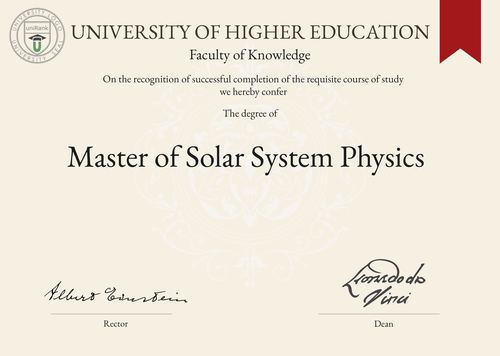
Master of Solar System Physics (M.S.S.P.)
Guide to Master of Solar System Physics Program/Course/Degree
Master of Solar System Physics (M.S.S.P.)

Program Name:
Master of Solar System PhysicsProgram or Degree abbreviation:
M.S.S.P.Duration range:
1-2 yearsTuition range:
Varies by country and universityOverview:
The Master of Solar System Physics program is designed to provide students with a comprehensive understanding of the physics and dynamics of the solar system. This program combines theoretical knowledge with practical skills to prepare students for careers in research, academia, or industry within the field of space science.Curriculum Overview by year:
- Year 1: Introduction to Solar System Physics, Planetary Science, Stellar Astrophysics, Electromagnetism, Quantum Mechanics - Year 2: Advanced Solar System Dynamics, Space Instrumentation, Data Analysis, Research ProjectKey Components:
- In-depth study of the physics and dynamics of the solar system - Hands-on experience with space instrumentation and data analysis - Research project to apply theoretical knowledge in a practical settingCareer Prospects:
Graduates of the Master of Solar System Physics program can pursue various career paths, including: - Research Scientist in space agencies or research institutions - University Professor or Lecturer in astrophysics or planetary science - Space Mission Analyst or Engineer in the aerospace industrySalary Expectations:
Salaries for professionals with a Master of Solar System Physics degree can vary depending on factors such as location, industry and experience. On average, graduates can expect competitive salaries in the range of $60,000 to $100,000 per year. For a more accurate understanding of salary expectations, you can utilize the Job Sites Search Engine, from our sister site jobRank, which searches over 4,600 job sites worldwide. Make sure to specify not only the job title but also the country you are interested in.Conclusions:
It is important to note that the duration, tuition fees, curriculum, key components, career prospects and salary expectations of the Master of Solar System Physics program can vary depending on the country or location where you choose to study, as well as the specific university you select. Visitors interested in pursuing this degree are encouraged to use the uniRank World Universities Search Engine to explore the various options available worldwide.World Universities Search Engine
search for Master of Solar System Physics (M.S.S.P.) and add the Location (country, state etc.) or specific University you are interested in studying at.
Query examples:
- Master of Solar System Physics (M.S.S.P.) United States
- Master of Solar System Physics (M.S.S.P.) United Kingdom online
- Master of Solar System Physics (M.S.S.P.) Australia international students
- Master of Solar System Physics (M.S.S.P.) University of California
- Master of Solar System Physics (M.S.S.P.) University of London tuition fees
- Master of Solar System Physics (M.S.S.P.) University of Sydney scholarships
Share Program/Course
Interesting? Share this program/course/degree info with your friends now.